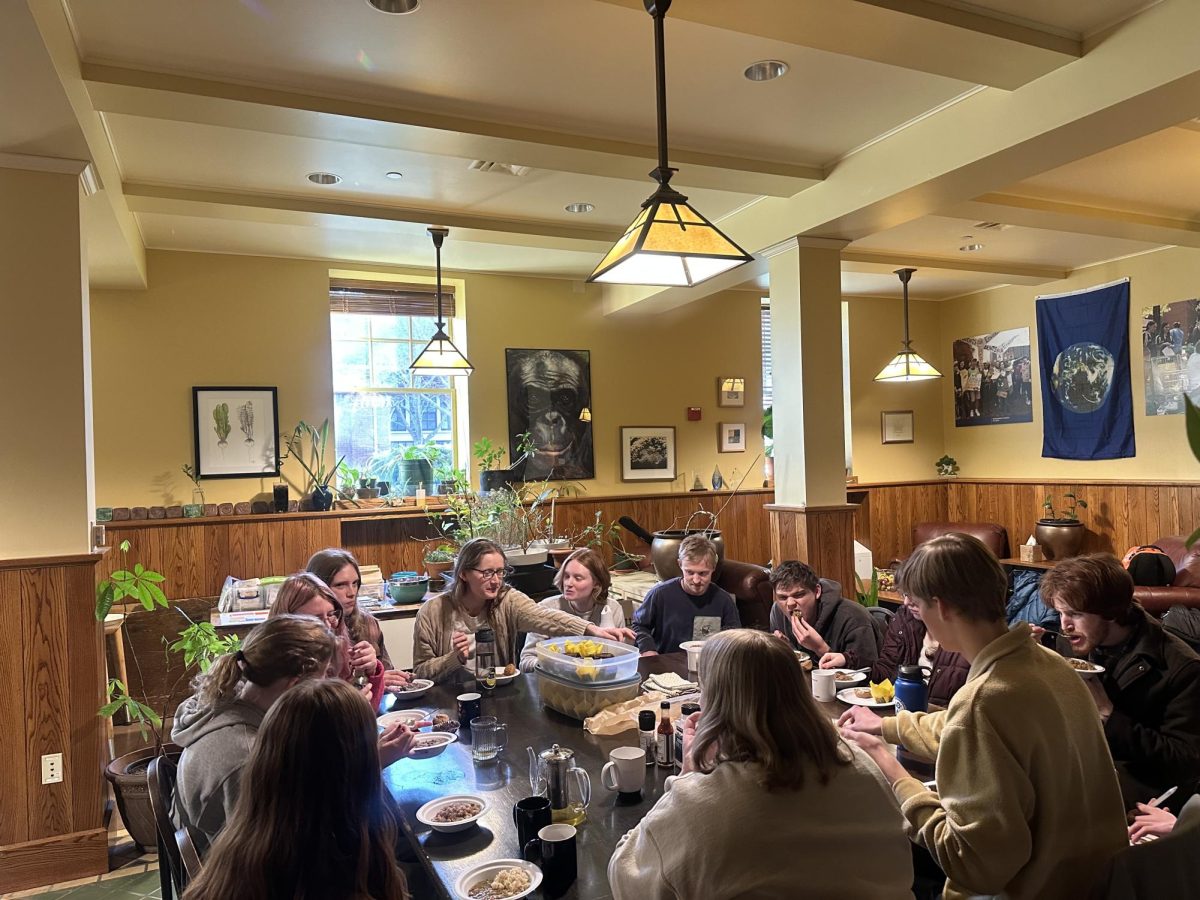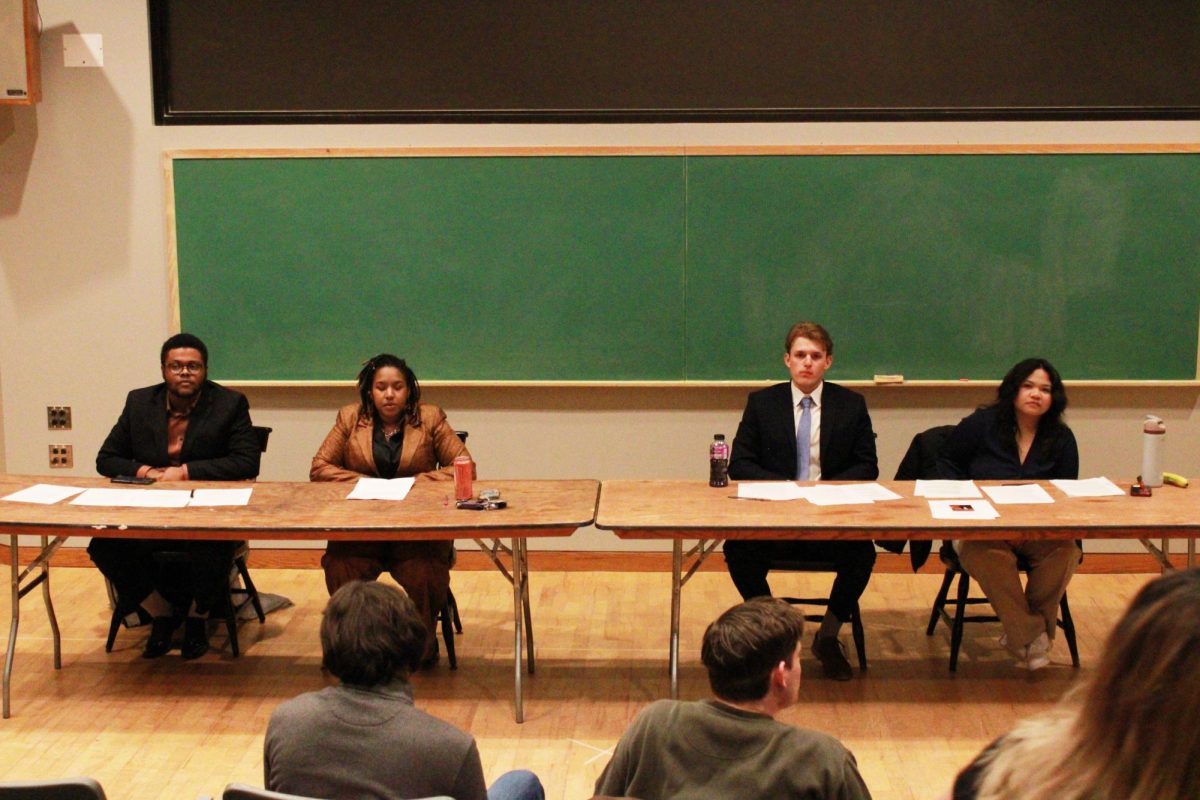Quick, where are you reading this story? Is it in print or online? Which do you prefer? The answers to these questions are shaping journalism as an industry and the changing future. Newspapers across the nation are closing their doors forever and journalists across the nation are trying to create a viable business model to make their product available to readers while also appealing to advertisers. As a newspaper that trains reporters and editors for a career of their own, The Campus is also attempting to answer the question of where people prefer to get their news now and in the future.

When AlleghenyCampus.com launched in January, it signified an acknowledgment that the style of journalism needed to alter in some way on campus. After paying $7.99 for a yearly domain and acquiring the help of the Allegheny Public Relations office, The Campus was officially online. Since then, The Campus writers and readers have been able to share stories and provide feedback on a level we’ve never seen before. The question being asked in the field of journalism is: will the online component take over the paper model?
Every week, The Campus distributes 1,200 copies of the newspaper to a college that has around 2,100 students enrolled. In the future, to cut costs and focus online, it is predicted that this 1,200 number will drop. In February, The Campus had 10,843 visits to the Web site, in March, 12,385 visits and in April, 10,548 visits thus far. These statistics prove that more people can read the news while The Campus is online.
The Campus also has a Twitter account (@AlleghenyCampus) which, as of press time, has 86 followers. The online component has allowed Allegheny’s journalism to reach out to alumni, and even those who do not feel like walking through the blizzards of January to pick up a newspaper.
College journalism allows for a different business model than regular newspapers. The Campus does not make any money on circulation, as students do not get charged 50 cents for our issues. The money The Campus receives comes from advertising revenue from local businesses and money from the Allegheny Student Government. The Campus is hoping to stay ahead of the curve to predict the future of journalism, and that may come with some harsh realities.
According to a story in Reuters published in 2008, 70 percent of Americans believe that traditional journalism is out of touch, and nearly half of Americans are turning to the Internet to get their news. As early as 2005, a survey by Pew Internet and American Life finds that the internet has become the primary source for news on the average day. This switch to online has some believing that print newspapers are becoming irrelevant. One of these people is Allegheny alum Max Potter.
Potter has an extensive resume as a journalist since departing from Allegheny in 1993. Potter started as an intern for the Meadville Tribune during his time at Allegheny and then realized that the magazine industry was more his type. He then interned at Philadelphia Magazine before entering Northwestern’s Medill School of Journalism. He has since wrote or worked for Premiere Magazine, Outside, Details, GQ, Rolling Stone and Men’s Journal. Potter is now the executive editor of 5280 Magazine, based in Denver.
“The printed page is going to be as rare as a two dollar bill in a decade or less, so why do it,” Potter said.
Potter advised The Campus to take a step toward the future and cut printing totally and put the budget into an enhanced online model.
When Potter came to visit Allegheny last semester, he was informed that The Campus does not have a large budget.
“You guys didn’t have much money,” Potter said. “Well, then why waste it on production costs, since printed newspapers are dying and won’t be around in five years or less. Look around. Count up how many papers have died in the last decade. How many are bankrupt or on the verge now? Why not let your journalism training serve a practical point? Create an iPhone App weekly magazine.”
Potter believes that college newspapers will adopt a “total online” model in the future.
“The smart ones will [adopt the online model],” Potter said. “Then again, schools with unlimited budgets and stodgy trustees will likely put up a pointless fight and therefore for a while a large number of printed college papers will endure. For a while. But as iPad-like devices become more and more prevalent, the papers are going to die, just like your textbooks.”
Another journalist who sees the benefit of online media is Deadspin’s Editor-in-Chief A.J. Daulerio.
Daulerio is the success story of online journalism.
“I actually didn’t choose to go into the internet side of business, the internet side of the business just happened,” Daulerio said.
After he finished college, Daulerio wrote for local newspapers in Pennsylvania and New Jersey, and then moved to New York and was a wire reporter for an online legal news publication. He then wrote for a financial newspaper covering the municipal bond market. Daulerio had a choice to make after he was rejected from alternative newspapers across the country.
“I took to the online world as my unpaid salvation,” Daulerio said. “There, at least, I could work on the stuff that made me feel like a real, live writer, even if it was the equivalent of open mic night at the diviest dive bar in East Japip.”
The journalism industry began to change. People began to migrate online to get their news. Daulerio lived and worked out of an apartment on the Lower East Side working on an online publication called The Black Table with Eric Gillin, now the online editor of Esquire.com, and other founding editors of the site, Will Leitch and Aileen Gallagher, both of New York Magazine.
“Even though our site was in no way a traditional blog, it was swept up in the initial second wave of online publishing and gained some good notoriety in New York City,” Daulerio said.
With their notoriety online came with freelance assignments at the New York Post, the New York Times, Salon and Maxim. Eventually, he was hired at Gawker media to launch a gambling blog which eventually failed, so he moved back to Philadelphia and wrote for Philadelphia Magazine, the same place where Potter interned. Daulerio then was brought on at Deadspin.com, which is currently the most popular independent sports blog.
Daulerio’s career thus far has been a hybrid mix of Internet and print success. He does see a difference between the blog and the newspaper.
“We don’t do what they do,” Daulerio said. “We curse, we’re satirical, we’re nasty, we publish rumors, we do things they’ll [newspapers] never be able to do. But I don’t use the fact that it’s a blog as a cop-out to be libelously reckless…And we do break stories and have original reporting as well. But we just go after the things that are (mostly) dismissed by traditional news organizations.”
Daulerio does not believe there should be a different set of journalistic ethics for online journalism versus newspapers and print journalism.
As far as Allegheny’s journalism model, Daulerio lines up with what The Campus is currently doing.
“I think a combination of both is necessary,” Daulerio said. “I think knowledge of how to write for both print and online can only be more useful to people who plan to have a career in this industry.”
Daulerio is one of millions of writers who go online to publish their work. However, his story is rare and comes few and far between. Daulerio is the ultimate success story in this morphing industry when many are wondering if his story will be the wave of the future. Will new journalists fully establish themselves online?
Matt Kiebus is a writer who also goes online as an “unpaid salvation.” Kiebus writes for Death and Taxes, a magazine that is printed every two months and produces an online component.
“I like holding magazines, newspapers and books in my hands rather than reading it on a laptop, iPad, or Kindle,” Kiebus said. “However, I’m still a realist and I believe it is smart to move to strictly an online publication. It will give your newspaper a lot more versatility.”
Kiebus writes that with newspapers declining, the online medium has been pushed to the forefront.
“Newspapers have become a secondary source for news behind the Internet,” Kiebus said. “Alumni rely on student newspaper’s Web sites to stay current with alma mater.”
He believes, like Potter, that newspapers will become obsolete in the future.
“I can’t predict how long it’ll take for all newspapers to make the transition because some will close and others will have too much pride to stop the presses,” Kiebus said. “When the papers all make the transition to the Web it becomes a matter of how to make money.”
This is a problem that city and national newspapers face, but The Campus has not yet encountered this problem. College newspapers are provided for free for students and community members.
All three journalists interviewed in this article, each from a different background, agree that the online components will become stronger in the future. Potter believes newspapers will become obsolete in a short time, Daulerio sees a need for college newspapers to have a balance between in print and online, and although Kiebus is nostalgic about traditional newspapers, he too agrees that newspapers will eventually all switch online.
Other schools across the nation are also asking themselves where they want their newspapers to steer their ship. Because student journalists have a different business model than professional media outlets, the urgency to cut print and go completely online is not there. However, college journalists do see what they are practicing as training for the real world and realize that they too must learn the online models of writing.
Dave Finn is the former senior sports editor of Georgetown’s The Hoya newspaper and is currently a contributing editor and the Hoya’s basketball team beat writer.
“Our online content and readership are two things that have grown in recent years,” Finn said. “While we’re still committed to putting out a good print product, there is a focus on improving The Hoya’s online presence.”
The Hoya’s Web site is updated whenever a new issue is released or when a breaking news incident occurs, or in Finn’s case, when a basketball game is over.
Finn was asked about the future of journalism at Georgetown and what the ramifications would be if a print newspaper was cut on campus.
“This has not been in the conversation,” Finn said. “There have been discussions about cutting our circulation. Going completely online would simply destroy the tradition or feel of reading a newspaper. No longer seeing newspapers on the stacks would eat away at the paper’s presence on campus and detract from students’ awareness of news.”
Another writer at a college newspaper is Rob Coloney, who is a staff writer at The Spectrum, the college newspaper of Sacred Heart University, located in Fairfield, CT.
Like The Campus, The Spectrum prints on Thursdays and has a Web site that provides stories to their readers.
When presented with the idea that some newspapers are going completely online and cutting print, Coloney did not see this happening at Sacred Heart anytime in the future.
“I do not believe this would ever be considered,” Coloney said. “No one would read the articles online – those are more for us as writers to establish an ‘E-Portfolio’ with links to our clips.”
Coloney agrees with Finn when it comes to printed journalism on a college campus.
“The in-print aspect is important on a college campus,” Coloney said. “If regular newspapers go online it would not be the end of the world, because people will always look online for major news from major places. For a college campus, students won’t go online to read an article regarding tuition prices, but might be more apt to pick up a paper and browse through it on their way to class.”
The Campus is currently on the side with the Daulerio’s and Coloney’s and Finn’s of the world.
Alex Jaffe, ’11, will be the Editor-in-Chief next year of The Campus.
“I have an immediate aversion to cutting print entirely,” Jaffe said. “I’m a real believer in the importance of print media. You can sit down with a paper at any time in any place, and I feel like newspapers really have a wider reach than Web sites, especially on such a small campus.”
Jaffe echoes the sentiment of Finn.
“The actual paper component offers The Campus the visibility it would not have if we were just online,” Jaffe said. “Who would remember to check the Web site every Thursday if they weren’t following our Twitter or if they didn’t see the papers stacked in our racks that morning?”
Though the print will not be cut next year, there are some changes Jaffe would like to implement.
“I think we want to improve and expand our online offerings, so we’ll be learning more skills and strategizing more for online content,” Jaffe said. “But we’ve been a print paper since 1876, why would we want to change now?”
Dan Bauer, ’13, is next year’s co-opinion editor.
“No one is going to read The Campus if it’s only online,” Bauer said. “The whole campus picks up the paper just at Brooks and that’s an audience we’d lose. I would love to have more video and more multimedia in general, but as far as diving into iPhone apps, we would be more getting into the trend than making a smart move for our future.”
Bridget McCartin, ’12, is a news editor at The Campus and believes that there should be a good balance between the two mediums of journalism.
“Online is a good place to start,” McCartin said. “But I think that The Campus needs to be able to know what our students want. Innovating and catering to what students want is our number one priority.”
Still, the future of journalism seems to be pointing in the direction of a solely online model. Potter argues that newspapers will become obsolete within five years, or less. Daulerio’s story tells us that there is a living to be made in online publishing.
“I don’t think of Deadspin as a stepping stone at all,” he said. “This is the most satisfied I’ve ever been creatively and financially and gives me more exposure and editorial freedom I will ever have again. Why on earth would I ever want to leave?”
The lack of urgency to change in college journalism is caused by the lack of full-time reporters who are expecting health benefits and have to support their family. Most writers for The Campus do not care whether their stories are read online or in paper. But in preparation for the future, journalists like Potter believe that learning the ways of the future would be beneficial to student journalists.
Some do not see Allegheny’s The Campus as wholly changing even in ten years.
“I imagine it would be pretty much the same,” Bauer said, reflecting on the current compromise between in-print and online media. “I hope that there will be more cooperation between The Campus and other media outlets at Allegheny. But I still see a print newspaper with technology incorporated without losing the core of us, the journalists, doing our jobs.”
While college papers might not be in a rush to change, it is argued by current journalists that a change to completely online would not be such a bad thing.
Many argue that an online publication might not have the same credibility as a print newspaper. However, Daulerio disagrees with those claims.
“Plenty of online publications are getting credit and have become trusted sources of information,” Daulerio said. “I still think that when a blog or other non-traditional publication breaks a piece of major news it’s considered major news to most people. And, of course, when an online publication gets something wrong or uses controversial means as to getting the story, it’s also scrutinized and undermined as much as possible. It’s [online media] definitely in a better place, but there’s still a long way to go.”
While doomsayers may look down at this future transformation from in print to online, Kiebus sees it differently.
“This is an exciting time for journalism, a time to expand and a time to evolve,” Kiebus said. “It’s not a death, it’s a rebirth.”









